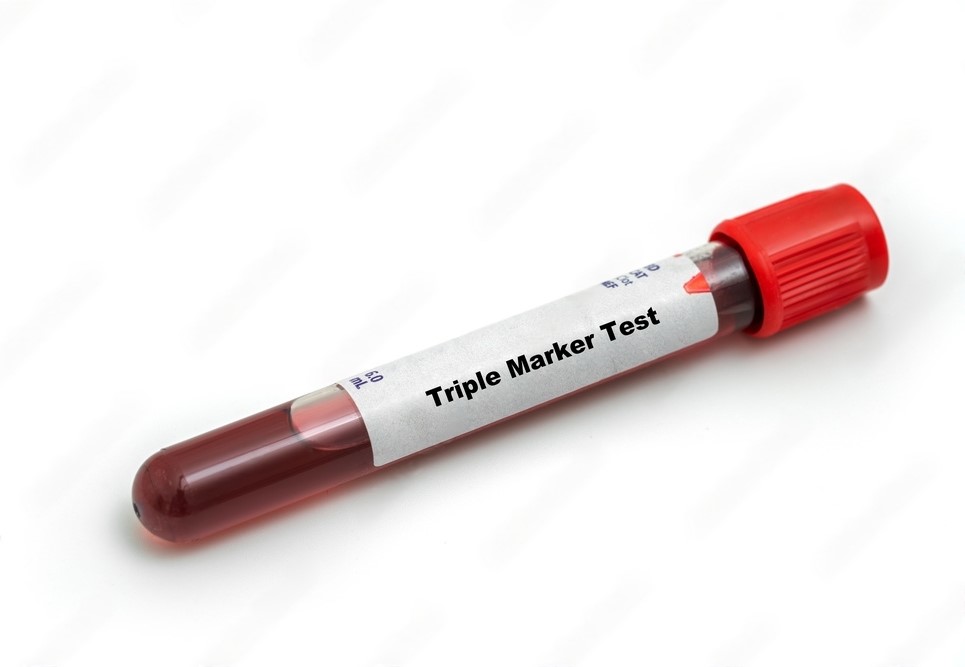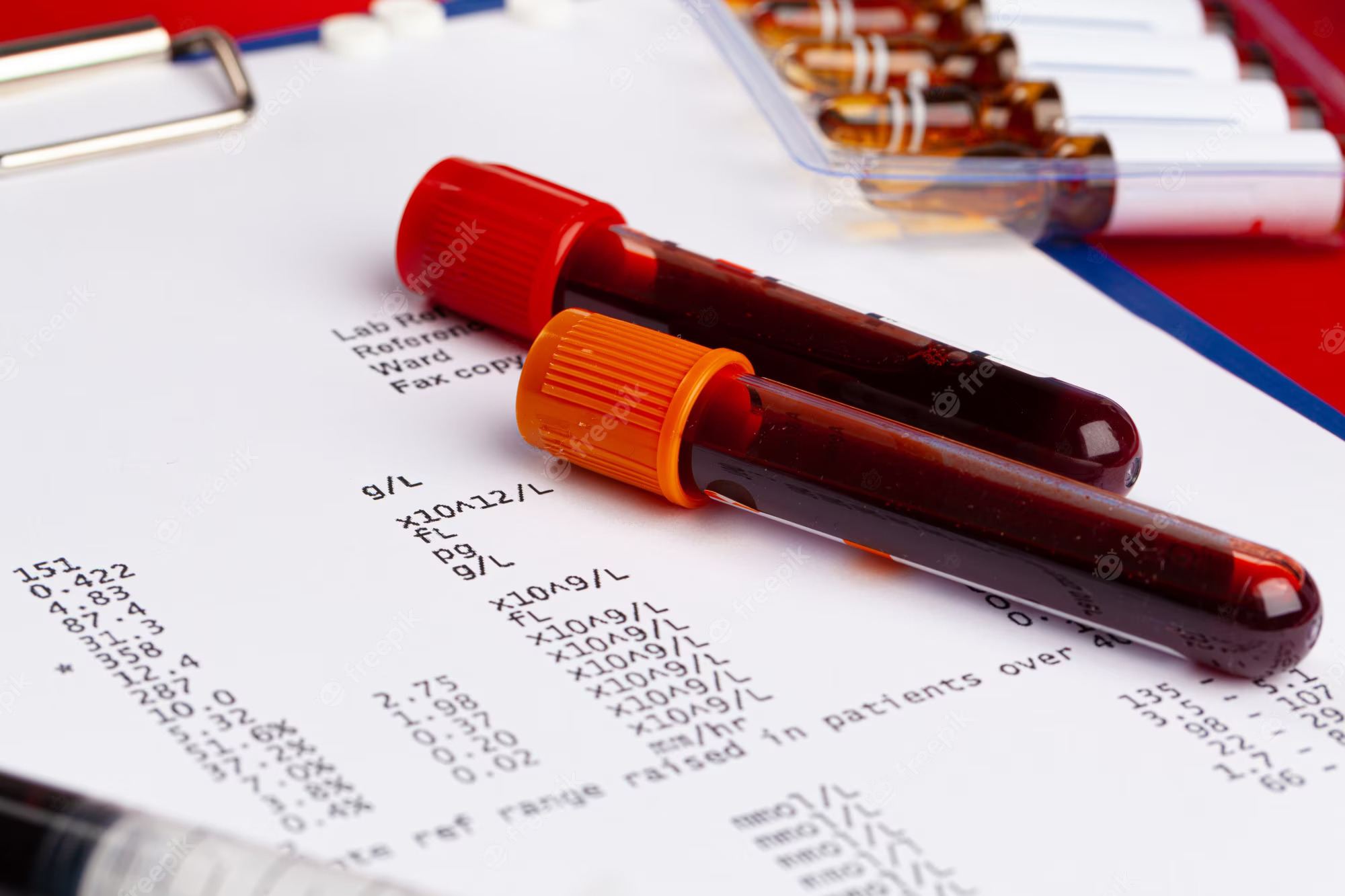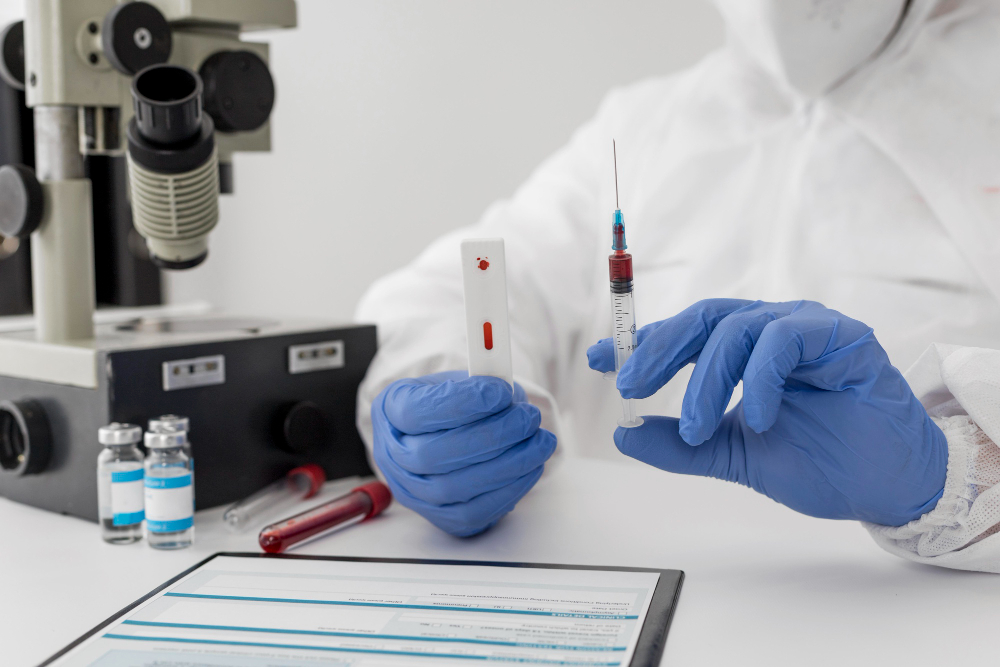Triple Marker Test – Procedure, Results and Benefits
What is a Triple Marker Test?
The triple marker test is a blood test that is performed on pregnant women. It is done to evaluate the risk of certain genetic disorders, such as Down syndrome, neural tube defects, and other chromosomal abnormalities. The test measures the levels of three different substances in the blood, namely alpha-fetoprotein (AFP), human chorionic gonadotropin (HCG), and unconjugated estriol (uE3).

Why A Triple Marker Test Is Done?
The triple marker test is usually done between the 15th and 20th week of pregnancy. It is primarily done to determine the risk of certain genetic disorders, such as Down syndrome, neural tube defects, and other chromosomal abnormalities. It is a non-invasive test and can be performed without any harm to the fetus. It can also help in identifying if the fetus has any abnormalities.
The triple marker test is typically recommended for women who are at a higher risk of developing genetic disorders, such as those who have a family history of such disorders, women who have previously had a child with a genetic disorder, women who are over 35 years of age, and women who have been exposed to certain drugs or chemicals during pregnancy.
When is the Triple Marker Test Done?
The triple marker test is usually done between the 15th and 20th week of pregnancy. However, it is important to note that the exact timing of the test may vary depending on individual cases. The test involves a simple blood draw, and the results are usually available within a week or two.
If the results of the triple marker indicate a higher risk of genetic disorders, further tests may be recommended, such as amniocentesis or chorionic villus sampling (CVS). These tests involve the collection of a sample of amniotic fluid or placental tissue and can provide more definitive results regarding the presence of genetic disorders.
It is important to note that the triple marker test is not 100% accurate and can sometimes produce false-positive or false-negative results. Therefore, it is important to discuss the results of the test with a healthcare provider and to undergo further testing if necessary.
The triple marker test is a non-invasive blood test that is performed on pregnant women to evaluate the risk of certain genetic disorders, such as Down syndrome, neural tube defects, and other chromosomal abnormalities. It is usually done between the 15th and 20th week of pregnancy and is recommended for women who are at a higher risk of developing genetic disorders. While the test is not 100% accurate, it can provide valuable information that can help in the diagnosis and management of such disorders.
What’s the Purpose of Triple Marker Test?
The triple marker test is a prenatal screening test that is done to assess the risk of certain genetic disorders in a developing fetus. The test measures the levels of three different substances in a pregnant woman’s blood, namely alpha-fetoprotein (AFP), human chorionic gonadotropin (HCG), and unconjugated estriol (uE3). The results of the test can help healthcare providers identify fetuses that may be at an increased risk of having Down syndrome, neural tube defects, and other chromosomal abnormalities.
Hormones Tested in Triple Marker Test:
The triple marker test measures the levels of three hormones in a pregnant woman’s blood:
- Alpha-Fetoprotein (AFP) – AFP is a protein produced by the fetus and is found in the mother’s blood during pregnancy. Elevated levels of AFP can indicate a neural tube defect, such as spina bifida, or an abdominal wall defect, such as gastroschisis.
- Human Chorionic Gonadotropin (HCG) – HCG is a hormone produced by the placenta during pregnancy. Elevated levels of HCG can indicate an increased risk of Down syndrome or other chromosomal abnormalities.
- Unconjugated Estriol (uE3) – uE3 is a form of estrogen produced by both the fetus and the placenta during pregnancy. Lower levels of uE3 can indicate an increased risk of Down syndrome or other chromosomal abnormalities.
By measuring the levels of these hormones, the triple marker can provide valuable information about the health of the developing fetus.
Who Should Consider Having a Triple Marker Test?
The triple marker test is generally recommended for all pregnant women, although some women may be considered at higher risk for certain genetic disorders and may be more likely to benefit from the test. Women who should consider having a triple marker test include:
- Women over the age of 35 – Advanced maternal age is a significant risk factor for having a baby with Down syndrome or other chromosomal abnormalities. Therefore, women who are over 35 may be advised to have a triple marker test.
- Women with a family history of genetic disorders – Women who have a family history of genetic disorders, such as Down syndrome, may be advised to have a triple marker test.
- Women who have previously had a baby with a genetic disorder – Women who have previously given birth to a baby with a genetic disorder may be advised to have a triple marker test in subsequent pregnancies.
- Women who have been exposed to certain drugs or chemicals during pregnancy – Exposure to certain drugs or chemicals during pregnancy can increase the risk of birth defects and other genetic disorders. Therefore, women who have been exposed to these substances may be advised to have a triple marker test.
The triple marker is a prenatal screening test that measures the levels of three hormones in a pregnant woman’s blood. The test is done to assess the risk of certain genetic disorders in the developing fetus, including Down syndrome, neural tube defects, and other chromosomal abnormalities. The test is generally recommended for all pregnant women, although women who are considered to be at higher risk may be advised to have the test. The results of the test can help healthcare providers identify fetuses that may be at an increased risk of having a genetic disorder, allowing for early diagnosis and appropriate management.
Why Should One Take Triple Marker Test in Pregnancy?

The triple marker test is a valuable tool for assessing the risk of certain genetic disorders in a developing fetus. There are several reasons why a pregnant woman may want to consider having a triple marker test:
- Early Detection – The triple marker test can help healthcare providers identify fetuses that may be at an increased risk of having Down syndrome, neural tube defects, and other chromosomal abnormalities. Early detection can lead to early intervention and appropriate management, which can improve outcomes for both the mother and the baby.
- Peace of Mind – Knowing that your baby is at low risk for certain genetic disorders can provide peace of mind and help alleviate some of the anxiety and stress associated with pregnancy.
- Preparation – If the results of the triple marker test indicate an increased risk of a genetic disorder, healthcare providers can prepare for the possibility of a high-risk pregnancy and make appropriate arrangements for prenatal care and delivery.
Precautions Before Triple Marker Test:
Before undergoing the triple marker test, there are several precautions that pregnant women should take:
- Consult Your Healthcare Provider – Before undergoing any prenatal screening test, it is important to consult with your healthcare provider. Your healthcare provider can provide information about the test, including its risks and benefits, and help you make an informed decision about whether to have the test.
- Choose the Right Time – The triple marker is usually performed between the 15th and 20th weeks of pregnancy. Pregnant women should schedule the test for a time when they are likely to have the most accurate results.
- Follow Fasting Guidelines – Pregnant women may be asked to fast for a certain period before the test to ensure accurate results. It is important to follow any fasting guidelines provided by your healthcare provider.
- Avoid Certain Medications – Certain medications, such as corticosteroids and some anticonvulsants, can affect the results of the triple marker test. Pregnant women should inform their healthcare provider of any medications they are taking before undergoing the test.
- Be Prepared for Possible False-Positives – The triple marker test is not a diagnostic test, and false-positive results can occur. If the test indicates an increased risk of a genetic disorder, further testing may be necessary to confirm the diagnosis.
The triple marker test is a valuable prenatal screening test that can help assess the risk of certain genetic disorders in a developing fetus. Pregnant women may consider having the test for early detection, peace of mind, and preparation. Before undergoing the test, pregnant women should consult their healthcare provider, choose the right time, follow fasting guidelines, avoid certain medications, and be prepared for possible false positives.
How a Pregnant Woman Should Prepare for the Triple Marker Test?
If you are pregnant and considering a triple marker test, there are several steps you can take to prepare for the test:
- Consult Your Healthcare Provider – Before undergoing any prenatal screening test, it is important to consult with your healthcare provider. Your healthcare provider can provide information about the test, including its risks and benefits, and help you make an informed decision about whether to have the test.
- Choose the Right Time – The triple marker test is usually performed between the 15th and 20th weeks of pregnancy. Pregnant women should schedule the test for a time when they are likely to have the most accurate results.
- Follow Fasting Guidelines – Pregnant women may be asked to fast for a certain period before the test to ensure accurate results. It is important to follow any fasting guidelines provided by your healthcare provider.
- Avoid Certain Medications – Certain medications, such as corticosteroids and some anticonvulsants, can affect the results of the triple marker test. Pregnant women should inform their healthcare provider of any medications they are taking before undergoing the test.
- Drink Plenty of Water – Drinking plenty of water before the test can make it easier to collect a blood sample and reduce the risk of fainting or dizziness.
- Wear Comfortable Clothing – Pregnant women should wear loose, comfortable clothing to the test to make it easier to collect a blood sample.
How Is a Triple Marker Test in Pregnancy Conducted?
The triple marker test is a blood test that measures the levels of three substances in a pregnant woman’s blood:
- Alpha-fetoprotein (AFP) – a protein produced by the fetus that is found in the mother’s blood
- Human chorionic gonadotropin (HCG) – It’s a hormone produced by the placenta
- Estriol – a hormone produced by both the fetus and the placenta
The test is typically performed between the 15th and 20th weeks of pregnancy, although some healthcare providers may recommend earlier or later testing depending on individual circumstances.
During the test, a healthcare provider will draw a small amount of blood from the pregnant woman’s arm. The blood sample will then be sent to a laboratory for analysis.
The triple marker test is a screening test, not a diagnostic test. If the results of the test indicate an increased risk of a genetic disorder, further testing, such as an amniocentesis or chorionic villus sampling (CVS), may be recommended to confirm the diagnosis.
Preparing for a triple marker test in pregnancy involves consulting with your healthcare provider, choosing the right time for the test, following fasting guidelines, avoiding certain medications, drinking plenty of water, and wearing comfortable clothing. The test itself involves a simple blood draw that measures the levels of three substances in the mother’s blood. If the results indicate an increased risk of a genetic disorder, further testing may be necessary to confirm the diagnosis.
Also Read: NT NB Scan
What Do the Triple Marker Test Results Mean?
The triple marker test measures the levels of three substances in a pregnant woman’s blood: alpha-fetoprotein (AFP), human chorionic gonadotropin (HCG), and estriol. The levels of these substances can provide information about the health of the fetus and the risk of certain birth defects.

Interpretation of the Triple Marker Test Result:
The results of the triple marker test are typically reported as either “screen negative” or “screen positive.” A screen-negative result means that the levels of AFP, HCG, and estriol are within the normal range and there is a low risk of certain birth defects, such as Down syndrome or neural tube defects. A screen-positive result means that the levels of one or more of these substances are outside the normal range, indicating a higher risk of certain birth defects.
Accuracy of Triple Marker Test:
The accuracy of the triple marker test depends on several factors, including the stage of pregnancy, maternal age, and the laboratory performing the test. The test has a detection rate of approximately 60-70% for Down syndrome and a false positive rate of approximately 5%. This means that the test can detect approximately 60-70% of cases of Down syndrome and will result in a false positive in approximately 5% of cases. However, it is important to note that a screen-positive result does not necessarily mean that the fetus has a birth defect. Further diagnostic testing, such as an amniocentesis or chorionic villus sampling (CVS), may be necessary to confirm the diagnosis.
It is also important to note that the triple marker test is a screening test, not a diagnostic test. A screening test is designed to identify individuals who may be at risk of a particular condition and should be followed up with further diagnostic testing. A diagnostic test, on the other hand, is designed to confirm or rule out a specific condition.
In summary, the results of the triple marker test can provide important information about the health of the fetus and the risk of certain birth defects. A screen-negative result indicates a low risk of birth defects, while a screen-positive result indicates a higher risk. However, the accuracy of the test is not 100% and further diagnostic testing may be necessary to confirm the diagnosis. It is important to discuss the results of the triple marker test with your healthcare provider and to follow up with any additional testing recommended.
How is the Triple Marker Test Performed?

The triple marker test is a simple blood test that is performed during pregnancy. The procedure typically takes only a few minutes and involves the following steps:
- Blood Sample Collection: The healthcare provider will collect a small sample of blood from the pregnant woman’s arm using a needle and syringe. The collected blood sample is then sent to a laboratory for analysis.
- Laboratory Testing: At the laboratory, the levels of three substances in the blood sample are measured: alpha-fetoprotein (AFP), human chorionic gonadotropin (HCG), and estriol. The laboratory will then calculate the risk of certain birth defects based on the levels of these substances.
- Results Interpretation: Once the laboratory testing is complete, the results of the triple marker test will be sent to the healthcare provider who ordered the test. The healthcare provider will then discuss the results with the pregnant woman and provide any necessary follow-up testing or referrals.
In summary, the triple marker test is a simple blood test that is performed during pregnancy to measure the levels of three substances in the blood. The procedure is non-invasive and does not pose any risk to the mother or the fetus. The test results can provide important information about the health of the fetus and the risk of certain birth defects and can help guide further diagnostic testing or referrals as necessary. It is important to discuss the risks and benefits of the triple marker test with your healthcare provider to determine whether it is right for you.
Risks of the Triple Marker Test:
The triple marker test is a relatively safe and non-invasive procedure that does not pose any significant risks or complications to the mother or the fetus. However, as with any medical procedure, there are some potential risks and drawbacks one should consider:
- False Positives: The triple marker test can sometimes produce false-positive results, meaning that it may indicate a problem when there is none. This can cause unnecessary anxiety and lead to further, more invasive testing.
- False Negatives: Conversely, the triple marker test can also produce false-negative results, meaning that it may miss a problem that actually exists. This can give a false sense of security and delay necessary medical interventions.
- Inconclusive Results: In some cases, the triple marker test may produce inconclusive results, which can also cause anxiety and lead to further testing.
- Psychological Impact: The results of the triple marker test can be emotionally charged and may cause significant stress and anxiety for the pregnant woman and her partner.
Benefits of the Triple Marker Test:
Despite these potential drawbacks, the triple marker test can also provide important benefits, including:
- Early Detection of Birth Defects: The triple marker test can help identify certain birth defects early in pregnancy, which can allow for early intervention and treatment.
- Planning and Preparation: If a birth defect is detected, the parents can use the information to plan for the child’s care and make necessary preparations before the baby is born.
- Peace of Mind: For parents who are worried about the health of their baby, the triple marker test can provide peace of mind by ruling out certain birth defects.
- Avoidance of Unnecessary Interventions: If the triple marker test results are normal, it can help avoid unnecessary interventions and invasive testing.
Triple Marker Test Price in India:

The cost of the triple marker test in India can vary depending on several factors, including the location, the laboratory performing the test, and any additional fees charged by the healthcare provider. On average, the cost of the test can range from Rs. 1000 to Rs. 4000. Some hospitals and clinics may offer discounted rates or packages for prenatal testing. It is important to check with your healthcare provider or laboratory to get an accurate estimate of the cost of the test. It is also worth noting that the test may not be covered by insurance in all cases, so it is important to check with your insurer to determine your coverage options.
Also Read: Double Marker Test
F.A.Qs:
Q: What is the use of triple marker test in pregnancy?
A: The triple marker test is a prenatal screening test that is used to detect certain birth defects and genetic abnormalities in the fetus, such as Down syndrome, neural tube defects, and abdominal wall defects.
Q: Is triple marker test compulsory?
A: The triple marker test is not compulsory, but it is recommended for all pregnant women, especially those who are at increased risk for birth defects or genetic disorders.
Q: Is triple marker test necessary after NT scan?
A: The triple marker test is not always necessary after an NT scan, but it may be recommended if the NT scan shows an increased risk for certain birth defects.
Q: What is the cost of triple marker?
A: The cost of the triple marker test can vary depending on the location, laboratory, and healthcare provider, but it can range from Rs. 1000 to Rs. 4000 in India.
Q: What is triple marker test cost?
A: The cost of the triple marker test can vary depending on the location, laboratory, and healthcare provider, but it can range from Rs. 1000 to Rs. 4000 in India.
Q: What happens if triple marker test is negative?
A: If the triple marker test is negative, it means that the risk for certain birth defects is low. However, it does not completely rule out the possibility of birth defects or genetic disorders.
Q: What is the normal result of triple marker test?
A: The normal result of the triple marker test varies depending on the gestational age of the fetus, but generally, normal results indicate a low risk for certain birth defects.
Q: What is age risk in triple marker test?
A: The age of the mother is a significant factor in the risk for certain birth defects, and it is taken into account when interpreting the results of the triple marker test. Women over the age of 35 are at increased risk for Down syndrome and other genetic disorders.
Q: What is the normal range of triple marker in pregnancy?
A: The normal range for the triple marker test varies depending on the gestational age of the fetus and the laboratory performing the test. However, generally, normal ranges indicate low levels of alpha-fetoprotein (AFP), estriol, and beta-HCG.
Q: What is the normal range for triple marker?
A: The normal range for the triple marker test varies depending on the laboratory performing the test and the gestational age of the fetus. Generally, normal ranges indicate low levels of alpha-fetoprotein (AFP), estriol, and beta-HCG.
Q: What is the normal range of triple marker in pregnancy?
A: The normal range for the triple marker test varies depending on the laboratory performing the test and the gestational age of the fetus. Generally, normal ranges indicate low levels of alpha-fetoprotein (AFP), estriol, and beta-HCG.
Q: Which is better dual marker or triple marker?
A: The triple marker test is considered to be more accurate than the dual marker test, as it measures three different markers instead of two.
Q: What is age risk in triple marker test?
A: The age of the mother is a significant factor in the risk for certain birth defects, and it is taken into account when interpreting the results of the triple marker test. Women over the age of 35 are at increased risk for Down syndrome and other genetic disorders.
Q: What happens if triple marker test is negative?
A: If the triple marker test is negative, it means that the risk for certain birth defects is low. However, it does not completely rule out the possibility of birth defects or genetic disorders.
Q: Is triple marker test accurate?
A: The triple marker test is a screening test, and like all screening tests, it is not 100% accurate. False positives and false negatives can occur, and further testing may be necessary to confirm or rule out a diagnosis.
Q: What happens if triple marker test is positive?
A: If the triple marker test is positive, it may indicate an increased risk for certain birth defects or genetic disorders. However, a positive result does not necessarily mean that the fetus has a birth defect or genetic disorder. Further testing, such as amniocentesis or chorionic villus sampling, may be necessary to confirm or rule out a diagnosis.
